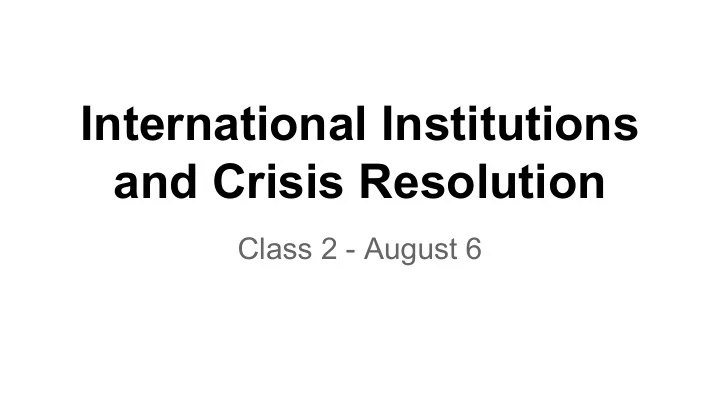

International Institutions and Crisis Resolution Class 2 - August 6
Plan for Today ● Quiz 1 ● Review of Theories on Institutions and Legalization ● Break ● Applying work on institutions to international political crises. ● Simulation expectations and country selection ● Syria Vice documentary
Institutions
Institution A structure or mechanism that governs behavior within a community and mediates rules that govern behavior. Examples?
International Institutions
International Institutions Structure or mechanism that governs behavior in the international community. Examples?
Issues dealt with by institutions ● Domestic: security, education, public safety, economic inefficiency, etc. ● International: security, economic inefficiency, protectionism, lack of common standards/regulation, lack of human rights, genocide, etc.
What types of problems should international institutions solve?
What types of problems should international institutions solve? ● Coordination ● Common-pool ● Core value
Coordination Problems ● Rules to assure common standards. ● Mutually beneficial.
Common pool problems ● Exhaustible, but non- divisible resources. ● Institutions would prevent exhaustion.
Core value problems ● Problems affecting basic rights established by international system. ● Institutions would uphold rights; punish violators.
Trade-off: Effectiveness and Sovereignty ● To empower international institutions, states must give up some authority over their own affairs. ● Unwillingness to cede sovereignty often leads international institutions to be weak and ineffective.
Strengthening IOs: Legalization
Strengthening IOs: Legalization ● Three dimensions: ● Obligation - are states bound by commitments? ● Precision - do rules unambiguously define authorized or proscribed conduct? ● Delegation - are third parties granted authority to implement, interpret or apply rules?
Obligation
Precision
Delegation
Variation on the three dimensions determines institutional strength. ● IOs strong along all three dimensions are considered “Hard Law.” ○ i.e. the European Union. ● IOs that lack strength along all three dimensions do not alter the default state of “Anarchy” ○ G8, G20, World Economic Forum.
Simulation Preview: Details after the break. Goal: as representatives of a group of countries, create new legal institutions as a way of dealing with crises. Part of assignment is to create proposals for potential agreement
International Institutions and Crisis Bargaining Can they have an effect?
How can legalization be applied to respond to international crises?
How can legalization be applied to respond to international crises? ● Rules can be developed to resolve both common pool and core value crises: ○ Montreal Protocol (1987) to ban CFCs for damaging ozone layer. ○ Third party monitoring to prevent interstate disputes from escalating to war. ● Required: ceding sovereignty to international institutions.
What do institutions actually do to defuse crises?
What do institutions actually do to defuse crises? ● Not very much. ● The UN is designed to gather the world’s powers to diffuse threats to global peace. ● In practice, the UNSC is generally deadlocked because of the ‘Big Five.’
Interventions by NATO, EU ● Can be more effective in terms of action. ○ i.e. Kosovo, Afghanistan. ● Seen as biased toward narrow Western interests.
What problems arise in coming together to solve crises? For which crises
What problems arise in coming together to solve crises? For which crises ● Domestic pressure ○ i.e. oil companies against climate change action. ● Preservation of sovereignty. ○ US refuses to join ICC. ● National security interests. ○ Allegedly: US in lead-up to Iraq War in 2003.
UNSC and 2003 Iraq War ● Why can’t security council agree to use force against Iraq? ● Why does the US act unilaterally? Are there consequences?
Background ● Axis of Evil speech identifies Iraq, Iran and North Korea. ● Iraq ruled by Saddam Hussein. ○ Regime harbored Islamist terrorists. ○ Developed weapons of mass destruction. ○ Poised for aggression against the US.
Background II Buuuut.... ● Saddam’s Islamist connection was to fight Kurdish rebellion. ● Regime had not developed WMDs since end of first Gulf War. ● Regime was secular, crippled by sanctions, had no intent to attack US.
US came to UN for force authorization ● Claimed Saddam had violated UN’s previous resolutions, should be removed. ● Initial resolution passed in November 2002. ● Further resolutions failed, were blocked by France, Russia and China. Why?
In March of 2003...
US invasion was against UN Charter. What were the consequences on its international standing? Why?
US invasion was against UN Charter. What were the consequences on its international standing? Why? ● US was (is?) global hegemon. ● The UN Charter was not binding international law. ○ Veto power gives Big Five universal guaranteed opt- out.
Was Iraq invasion an international political crisis? Yes? No?
Simulation Expectations Tutorial 2
Structure ● Each person gives 3-5 minute pre-prepared proposal as representative of their country. (50%) ● Followed by discussion session, where representatives can challenge proposals made by others (30%). ● 20% is to take assignment seriously!
Your role ● You will be a representative from a chosen country (out of 10), attending a summit to resolve a crisis. ● The goal of the summit is to create a durable solution to whatever crisis is taking place. ● Your proposal to add to the solution should be from the perspective of your country, as should how you behave at the summit.
Proposals ● Make proposals that are: ○ Likely to be adopted. ○ Help resolve the crisis. ○ Benefit your country. ○ Impede proposals that don’t benefit your country or benefit your rivals. ● You can coordinate ONLY with those countries that it’s plausible for you to coordinate with.
Class 3 Simulation: Syrian Civil War spillover: - Refugee crisis in Lebanon and Jordan escalates to conflict between refugees and host countries. - Summit organized by UNSC Big Five, Saudi Arabia, Turkey, Germany, Italy and Japan.
Your job is to address three issues: ● Food and housing aid distributed to refugees. ● Status of refugees as residents of Lebanon, Turkey and Jordan. ● Legal pathways to asylum in developed countries, such as EU, US or Japan to alleviate demographic pressure.
Recommend
More recommend